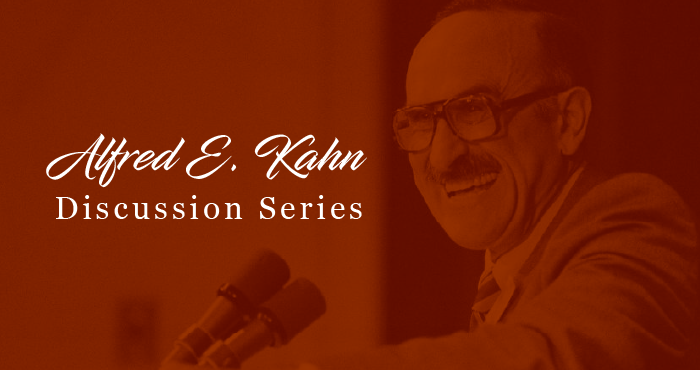
“Whenever competition is feasible it is, for all its imperfections, superior to regulation as a means of serving the public interest.”
Alfred Kahn (1917-2010) had a distinguished career in the academy, private consulting, and the halls of government. First as chairman of the New York State Public Service Commission and then as chairman of the Civil Aeronautics Board and the Council on Wage and Price Stability during the Carter administration, he valued and elevated empirically grounded, evidence-based decision making, plainspoken communications, and forthrightness.
In early 2017, CEI launched a discussion series in honor of Kahn’s contributions to deregulation, coalition-driven policy change, and general understanding of regulatory economics.
About Alfred E. Kahn:
Born in 1917, Fred Kahn graduated summa cum laude from New York University at the age of 18 and earned a doctorate in economics from Yale University. An Army veteran, he chaired the economics department at Ripon College before moving to Cornell University in 1947, where he remained for the rest of his long and productive career. Kahn had a long relationship with the leading consulting firm National Economic Research Associates, now known as NERA Economic Consulting. He died at the age of 93 in 2010.
As chair of the Civil Aeronautics Board (CAB) in Jimmy Carter’s administration, Kahn spearheaded the U.S. Airline Deregulation Act of 1978, effectively deregulating the agency out of existence and laying the groundwork for freer, more dynamic markets in the air, rail, trucking, telecommunications, finance, and utility industries. The echoes of his pioneering work are still felt today.
Renowned for his wit, Kahn began a “war on bureaucratese” within a month of joining the CAB and charged his staff to use simple language: “If you can’t explain what you’re doing in plain English, you’re probably doing something wrong.” As Chairman of the Council on Wage and Price Stability, or more commonly, the “inflation czar,” Kahn again made headlines for his empirically driven assessments and clear, if impolitic, rhetoric. Repeatedly cautioned by political staff against alarming citizens about a possible “depression,” he began instead to publicly warn of an impending “banana” and later, after a banana company objected, a “kumquat.”
About the Discussions:
Celebrating Kahn’s legacy, CEI’s Alfred E. Kahn events are thematic, invitation-only discussions of deregulatory opportunities and the means necessary to accomplish them.
Questions? Email [email protected]
Events:
December 4, 2024 – Representative Harriet Hageman (WY) explored what can be done about the rising fusion of spending and regulation and how to transform analysis into legislative accomplishment with the blessings and limitations of the end of Chevron deference.
November 28, 2023 – One week before the U.S. Supreme Court hears arguments in Moore v. United States, BakerHostetler Partner and lead counsel Andrew Grossman laid out the challenge to the Mandatory Repatriation Tax provision of the 2017 Tax Cuts and Job Act brought by CEI and BakerHostetler on behalf of Charles and Kathleen Moore.
November 15, 2023 – Former FTC Commissioner Christine Wilson highlighted the Federal Trade Commission’s rampant abuse of power, under the direction of Chair Lina Khan, and current opportunities for FTC reform.
August 2, 2023 – Former Labor Secretary and Gibson, Dunn & Crutcher Partner Eugene Scalia discussed the risks and legal challenges to the environmental, social, and governance (ESG) investing of pension funds.
April 13, 2023 – Former British Prime Minister, the Right Honorable Liz Truss MP joined CEI and allies to discuss global economic challenges and opportunities for growth.
January 31, 2023 – Former FTC Chairman Tim Muris and former Director of the FTC’s Bureau of Economics Bruce Kobayashi discuss the FTC’s forthcoming merger review guidelines and outline specific reforms to curtail the application of discredited legal and economic analytical tools.
February 16, 2022 – The Alfred E. Kahn Discussion on strategies to reclaim American values in current policy debates featured John Hood, the president of the John William Pope Foundation and cofounder of the John Locke Foundation.
June 23, 2021 – Former Secretary of Transportation and Secretary of Labor, Elaine E. Chao, discussed prospects for bipartisan agreement on policy proposals to structurally change the regulatory state.
September 26, 2019 – Consumer Financial Protection Bureau Director Kathy Kraninger discussed current regulatory challenges and the path forward for sensible financial reform.
October 17, 2018 – Two weeks before CEI’s Frank v. Gaos Supreme Court hearing, named petitioner and Director of CEI’s Center for Class Action Fairness, Ted Frank and fellow class member and Senior Attorney Melissa Holyoak discussed their strategy for oral arguments. Frank v. Gaos challenged cy pres abuse, specifically the settlement reached in the Gaos v. Google privacy lawsuit.
November 6, 2017 – As Chair of the House Republican Conference, Cathy McMorris Rodgers initiated a conversation with nonprofit leaders in the liberty movement about some of the biggest challenges the country was facing.
March 7, 2017 – The Alfred E. Kahn Discussion on labor policy featured Vincent Vernuccio, Director of Labor Policy at the Mackinac Center, formerly of the Competitive Enterprise Institute, and recent member of President Trump’s Labor Department transition team.
February 28, 2017 – The Alfred E. Kahn Discussion on trade liberalization opportunities in the new administration featured Angela Ellard, Chief Trade Counsel for the House Ways and Means Committee.
February 13, 2017 – The Alfred E. Kahn Discussion on transportation policy featured Shirley Ybarra, former Virginia Secretary of Transportation and leader of the Department of Transportation Agency Action Team for President Trump’s transition.
January 26, 2017 – The inaugural Alfred E. Kahn Discussion featured Dr. Jeffrey Eisenach, a lead Trump transition advisor for the Federal Communications Commission. Eisenach first articulated a plan for fundamental reform of the agency in 1998.